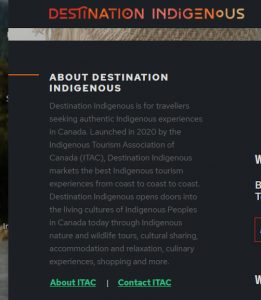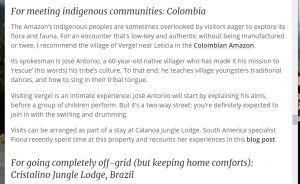Ayahuasca Shamanism: A Tourist Attraction
This week’s readings on the Shipibo- Konibo people was quite eye opening in terms of providing a great example of cultural appropriation due to globalization. As discussed in the readings, the rubber boom in the Peruvian Amazon had a direct relationship with Ayahuasca Shamanism becoming the million-dollar industry it is today. It was in the establishment of reducciones that resulted in the transfer and exchange of cultures in the region that soon expanded into the global sector of communication. As a lot of things in Latin America or in Indigenous cultures, the western world appropriates ‘traditional’ cultures as their own for capitalistic value.
Enter Gringo Shamanism.
Ethnotourism fetishizes the ‘authentic Indigenous experience’ and determines how Indigenous cultures can be ‘marketed’ to extract capital from western (and by that, I mean colonial) states. The affects of extracting and appropriating Indigenous cultural experiences are immense. Firstly, it dilutes the significance of Ayahuasca Shamanism and misinforms the masses about its role in Indigenous lifeways. Second, it boasts of the ‘authentic’ Indigenous experience without discourse on colonialism, the enslavement of Indigenous peoples or how cultural appropriation has had a role in the loss of Indigenous knowledge.
I think the second point is most important, as Prof Smith mentions as well, because it ignores the histories Indigenous peoples have had for over 500 years since the Conquest. It severs the New World from any responsibilities to acknowledge wrongdoings or to acknowledge the violent histories these peoples have had for centuries. More specifically for the Shipibo Konibo people, the ignores the incredible exploitation, past and present, of their communities.
This is a common trend in a lot of ‘other’ cultures especially as travel has become accessible over time. Tourism is all about the ‘authentic’ experience and immersing yourself amongst ‘the people’. It is less about appreciating the cultures and more about making it your own. This can be dangerous because it presents the idea that anything in this world can be occupied by anyone else regardless of their relationship to the culture. There is this inherent ownership western cultures have with the Indigenous cultures that silences their history and exoticizes their ‘humble’ lives like animals at a zoo. This requires the Indigenous communities to then perform their culture for the eyes of outsiders who are exploiting their culture for entertainment purposes.


https://www.audleytravel.com/ca/south-america/region-guides/the-amazon
https://destinationindigenous.ca/blog/
All that being said, one part about this week’s lecture challenges the idea of cultural appropriation and the idea of ‘authentic’ or ‘traditional’ experience: Part of Shipibo culture is about appropriating other cultural forms into their traditions and in their art forms. If the Shipibo people can borrow aspects from other cultures, when is appropriating considered good or bad? Is it even appropriating?
Obviously, there is a HUGE difference between shaping your lifeway to include elements from other cultures versus paying thousands of dollars to take ayahuasca for the ‘high’ of it. There is also a huge difference between going to the Amazon and supporting a community-based lodge versus getting the brew from some dude on the internet in the United States. But it does beg the question, can cultural appropriation have a positive outcome?